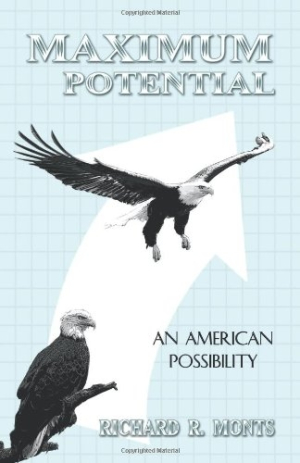
Maximum Potential
An American Possibility
Albert Einstein once said, “Things should be made as simple as possible, but no simpler.”
These days, it’s a quote that more elected officials should keep in mind. But for Richard R. Monts, author of Maximum Potential: An American Possibility, Einstein’s statement is a plea to return to the document that guided the foundation of our country, the Constitution, in hopes of achieving an even greater future.
Mont begins by making the case that the American government has slipped away from the tenets set down by our founders more than 200 years ago. With so many people and resources in our country, he notes, refocusing on the original set of policies could improve our government and lives.
“Everything that the government does in this country should be to help the individual citizens achieve maximum potential in their lives,” Monts writes. “Their social, cultural, artistic endeavors, their professional endeavors, their family relations, everything should be set in a stable simple environment.”
Monts examines some of the issues Americans face today, such as free speech and immigration, and suggests that reapplying the Constitution could have a positive outcome.
It’s clear that Monts is passionate about the Constitution and genuinely searching for answers. Sometimes, his ideas seem promising. While writing this book during the BP oil disaster, Monts criticizes the government for not stopping the leak sooner and suggests a reform of FEMA.
In other cases, his solutions seem naive. When urging the government to be kind to businesses, Monts suggests that this should include tort reform “…lead by disenthralled legal professionals in a patriotic mind set.” But how does one define a patriotic mind? And how does one ensure that patriotic minds do not get caught up in the power and political struggles that currently exist?
Whether Monts’ ideas are good or bad, his case would be better served by backing his arguments with citations. For instance, Monts begins his analysis of free speech by claiming that the current administration is trying to control the airwaves through the FCC. It might be better if he discussed the recent interest in reinstating the Fairness Doctrine, a revoked FCC policy that required broadcasters to present all sides of a controversial public issue. Then Monts could make a stronger argument by quoting people on both sides of the issue and sourcing these to support his point; even the most opinionated political commentators, such as Ann Coulter, Rush Limbaugh, and Sean Hannity, do this.
The saving grace of Monts’ book, however, is his earnest belief in the American government and its people. In an age when political vitriol can corrupt the conversation, Monts’ book calls for a logical and rational discussion of government based on the tenets of the U.S. Constitution.
And that, in itself, would be refreshing.
Reviewed by
Katerie Prior
Disclosure: This article is not an endorsement, but a review. The publisher of this book provided free copies of the book and paid a small fee to have their book reviewed by a professional reviewer. Foreword Reviews and Clarion Reviews make no guarantee that the publisher will receive a positive review. Foreword Magazine, Inc. is disclosing this in accordance with the Federal Trade Commission’s 16 CFR, Part 255.
